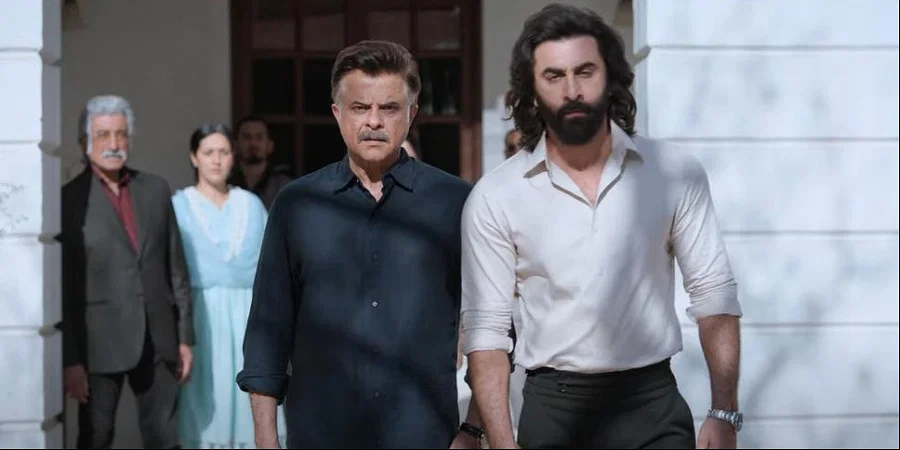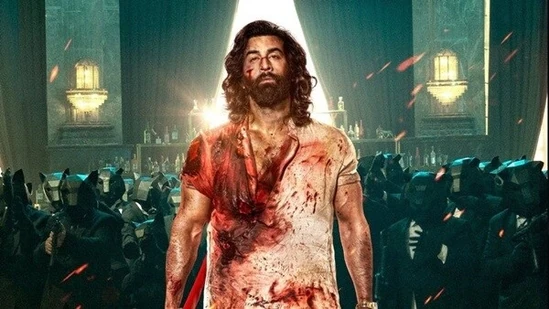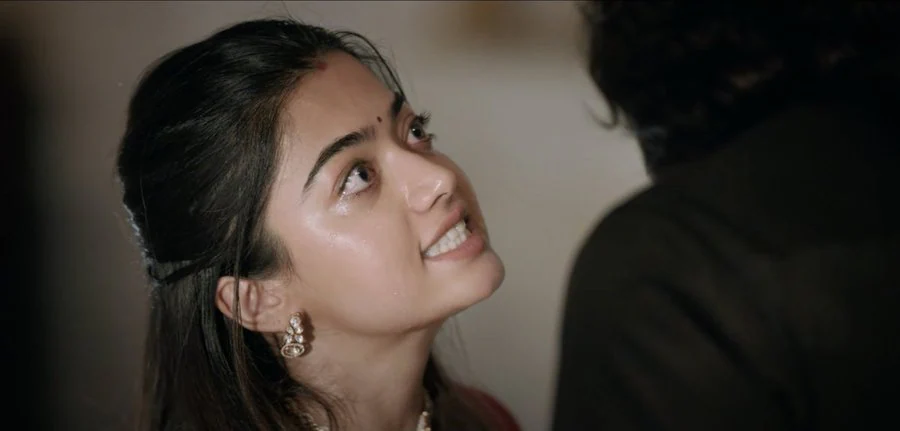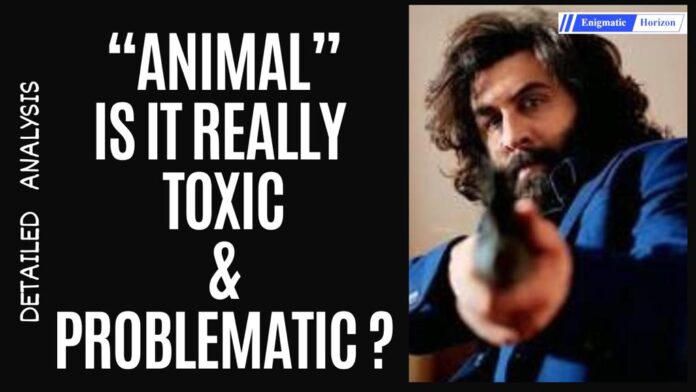Robin Bhuyan
Nupur Jha
Sandeep Reddy Vanga’s Animal is gaining massive recognition, and as of 11th Dec, it has already crossed 700 crores, with domestic and overseas collections.
Despite the official success, the film is in debate for its so-called misogynistic, violent, and unrealistic depiction of characters. Many critics and Youtubers are calling it one of the most toxic and problematic films in Indian cinema. While some viewers hail it as Ranbir Kapoor’s best work to date, others question the sensibility of Reddy’s direction. The film has attracted a huge negative criticism as well as hatred from critics, especially those who are left leaning and inclined towards feminism.
But does the movie actually deserve the hate and negative tags? Does the film actually have something that might influence the young generation? Here, we present a detailed analysis of Vanga’s ‘Animal.’
Warning: Major Spoilers Ahead – This is not a film review but a detailed analysis
The Story, Characters & Music
‘Animal’ narrates the story of Ranvijay Singh Balbir (played by Ranbir Kapoor), a wealthy, strong-willed man of rule with a dominating “alpha male” personality. He is the son of Delhi-based industrialist and business tycoon Balbir Singh (played by Anil Kapoor), who is often too preoccupied with his work and has little time to spare for his family.
Ranvijay grows up yearning for his father’s love and time, making him desperate and territorial. When his father falls victim to a gunshot, Ranjvijay returns from the US after many years and steps into the role of the ‘man of the house’ and sets out to find the culprit and seek justice.
Shortly after its release, the film gained criticism aimed due to its characters, particularly Ranvijay, from feminist critics. But do they have a solid foundation? While answering this question, it is important to consider that the movie takes you to a world devoid of conventional morality—where things are not entirely black nor white.
If the audience as well as critics have no problem accepting Joker as a morally gray character, it is a surprise that they are dissing ‘Ranvijay’s actions.’ How many of these critics were worried that the 2019 movie Joker would have a negative influence, due to its portrayal of violence? However, the conscience of these critics seem to have awakened from a deep slumber after the release of Animal. The movie or the characters were not crafted to suit our idealistic world but depict that people aren’t always just good or bad. It shows us how circumstances make you do things that you otherwise may not.
In contrast to films like Udaan and Thappad, which offer easy solutions to family conflicts, where the main character leaves their house or family, thus, breaking the family apart, Animal has done things differently.
Animal by Vanga gives us a character that chooses to stand firmly with his family and protect them at any cost. He is willing to go to great lengths in order to find the culprit who attacked his father, despite the fact that he was always deprived of his father’s love. There are films like Udaan and Thappad, where breaking up with your family is shown as a solution to family conflicts. If these kinds of movies are hugely appreciated, then why there is such a fuss over a film like Animal, is yet to be understood.
In addition, it is important to remember that the film allows the audience to explore the blurred lines between right and wrong, presenting a narrative, characters, and actions that defy societal norms. These characters aren’t designed for educational purposes but aim to provide the audiences with unfiltered entertainment.
The story shows a guy who stands firm for his family, breaking the rules and going beyond what’s wrong or right, whether he had to take a gun to his sister’s college because she was getting bullied or killing his brother-in-law, as he was working alongside the people who attacked his father.

While Ranvijay’s actions may not be always morally justifiable, Vanga emphasizes the depth of a man’s love and protective instincts towards his family and the lengths he can go if his family gets threatened.
This Is Vanga Reddy’s World
Vanga is known for his bold choices and unfiltered direction. Despite the controversy surrounding his Bollywood debut, Kabir Singh, Vanga remains unafraid to give his audience flawed and controversial characters.
The audience must recognize that Vanga creates a world that is uniquely his own, unapologetic in its portrayal of raw emotions.
The director refrains from conforming his characters or narratives to societal expectations or political correctness. His distinctive direction adds a sense of freshness, presenting characters that deviate from reality.
Within his fictionalized world, there are no rigid laws or rules, contributing a stylistic element that sets his work apart in cinema. If you are going to the cinema, hoping that the characters will conform to your morals or societal standards, you are going to be disappointed!
Where The Film Succeeds and Where They Failed
Animal experiences its own share of highs and lows. The movie captivates with an intriguing first half, but the pace slows down, and several key points are missed in the second half. While the surprising credit scene shocked the audience, the movie held the attention throughout its lengthy runtime.
So, while it may seem illogical to criticize the film for having characters that doesn’t conform to our moral standards, there may be other aspects of the film that may be worthy of criticism. So let us see in which aspect the movie is a success, and in which aspect it fails!
Handling Gore & Violence
The movie’s criticism extends beyond the characters, but critics also target Director Vanga personally, labeling him as toxic and questioning his mental state.
In an industry where many Bollywood films tend to downplay the brutality in their portrayal of gore, Vanga successfully presented his scenes without any hesitation. For anyone who feels this is problematic, a word for them – there would surely be dozens, if not hundreds, of movies released in the last two decades, where the violence shown would be on par with, or far worse than what this movie portrays.

Vanga’s cinematic world extends far beyond our everyday experiences, portraying a perspective where men are portrayed as protectors and providers, embodying traditional roles. His approach to female leads tends to be more submissive and supportive, similar to earlier times.
While Vanga’s writing often emphasizes the concept of strong and idealized manhood, it doesn’t shy away from showcasing the consequences. For instance, in Kabir Singh the protagonist’s pursuit of his idea of masculinity has a disastrous impact on his career, family, and the loss of his true love. Similar things occur in Animal, as Ranbir has to suffer the consequences of his actions as well.
Introducing Freshness In Directorial Approach
Violence is not new in Bollywood movies, but Vanga’s take on showing it as it is added freshness. From telling a family-centric story to showing the troubled and complex characters, Vanga successfully made the audience addicted through his directorial approach.
The Unconventional Anti-Hero
We all grew up watching heroes who could do no wrong—a righteous figure with unwavering principles, always choosing the morally correct path, regardless of the circumstances.
However, Ranvijay’s character in Animal breaks away from the conventional idealist hero archetype we’re accustomed to seeing in movies. He is flawed, displays casual sexism, and adhers to his own self-made rules.
Feminist critics comment on Ranvijay, a character portrayed as toxic, engaging in infidelity and demanding a girl to apologize by licking his shoes. Again, it is crucial to note that Ranvijay is not the conventional ‘hero’ but rather an ‘anti-hero’ capable of extreme actions, such as killing hundreds of mercenaries with an axe and a machine gun to protect his father. He is far from what we have seen in typical Bollywood movies. By any means, his actions may not be always right, but that’s just how the character is, and critics can’t seem to accept that!
It is noteworthy that the character of Ranvijay, driven by a desperate desire to save his father, ultimately finds out that he might lose him to cancer—an outcome beyond his control, which makes him come to a realization. He begins to reflect on his life and also understands that he is a father himself now and what was done to him should not be reversed with his son.
Unapologetic Characters & Bold Storyline
Vanga’s characters are unapologetic in their choices and unafraid to alter the foundations upon which they were built.
Take, for instance, Ranvijay, who initially promises his wife, Geetanjali, never to cheat on her, ends up sleeping with Zoya in the second half. While his original intent was to obtain information from her and he does confess and apologize to Geetanjali, his unexpected bold choices surprised the audience.
Ranvijay sacrificed everything, even jeopardizing his married life and letting his wife go, all in the relentless pursuit of protecting his father. Despite portraying a bold and alpha personality, his character was not immune to the pain and vulnerability of his choices.
In the second half of the film, Ranvijay grapples with the aftermath of the bloodshed he initiated, resulting in the loss of his hearing and a near-fatal heart failure.
Balbir Singh, a self-centered and stubborn father, undergoes a significant transformation by the film’s end. He acknowledges his wrongdoings and apologizes for the harm his ignorance had caused. The film had several moments where characters took turns, which was least expected from them. Vanga does not shy away from depicting the highs and lows, providing a raw and authentic portrayal of the aftermath of the characters’ choices.
Characters could have been written better?
Despite the extensive discussions surrounding the film’s actions and choices, it could have been more justified if Vanga had delved deeper into the story as well as added greater depth to the character relationships. The conflict between the father and son could have been quickly resolved with a simple conversation, potentially avoiding many unnecessary complications. Instead of creating a generational family conflict, the film probably also needed more sense of danger to challenge our anti-hero to push his limits.
The story needed more exploration in establishing relationships between Ranvijay and his father along with the other family members. In addition to this, the villains, too had limited depth—they were introduced with a fight and concluded with a fight. The audience didn’t get enough time to connect with what was happening and, more importantly, why it was happening. The character Geetanjali could have also been written in a much better way.

Too Long – And Some Things Were Unnecessary.
Despite having a runtime over more than 3 hours, the film needed to dedicate more time to establishing emotions and relationships between characters. The placement of songs felt inconsistent and disrupted the narrative flow.
The first and last interaction/fight sequence between between Ranjvijay and Abrar needed more detail. Despite the fact that Bobby Deol did his job well, the confrontation felt forced and was a big letdown.
Does Animal Deserve This Much Hatred or Debate?
In conclusion, there are movies with much more intense violence. It’s not Sandeep Reddy Vanga’s responsibility to tone down his story and characters, especially considering the ‘A’ certificate the movie received from the Censor Board. Vanga did not endorse cheating or violence; instead, he depicted that all actions have their consequences.
As for Animal, it would be fair to say that the film doesn’t deserve this amount of hatred and debate. It does not seem right in calling it misogynistic and promoting violence or toxicity, considering the fact that people were warned multiple times that this film is not for sensitive people, nor it is a film meant to teach us moral values. The film is fictional and is meant to entertain us. Does it succeed in doing so? Definitely!
